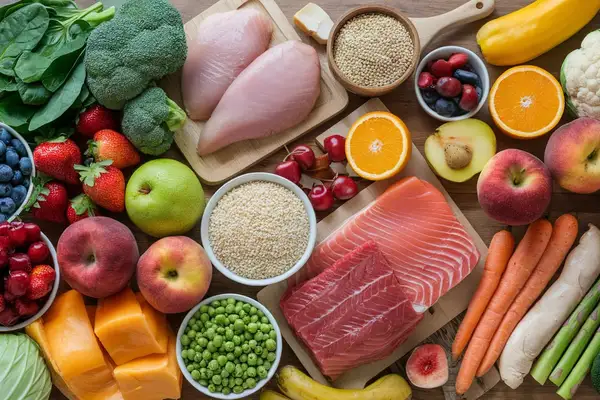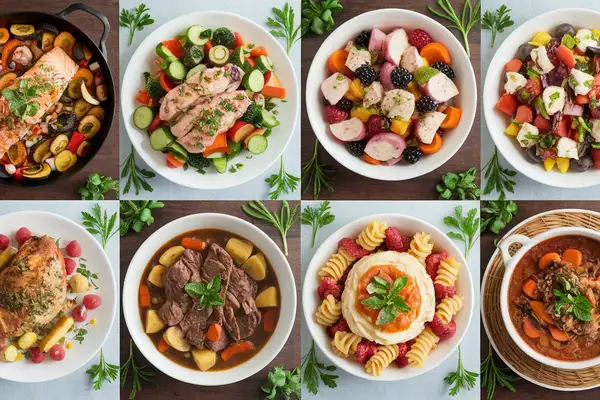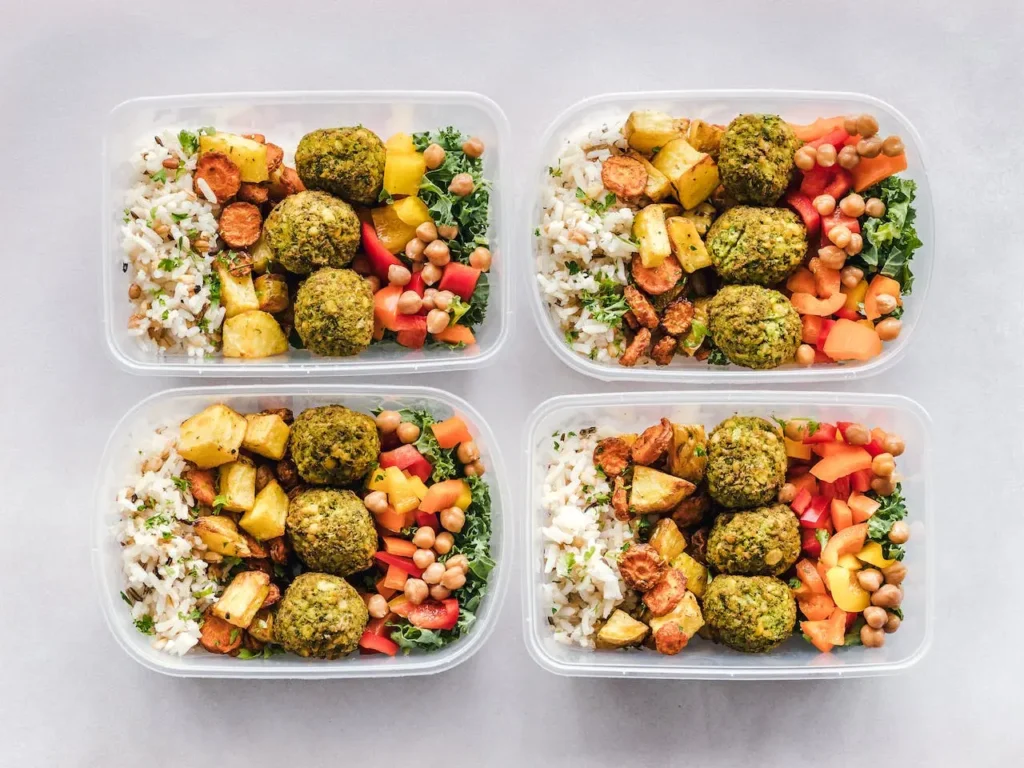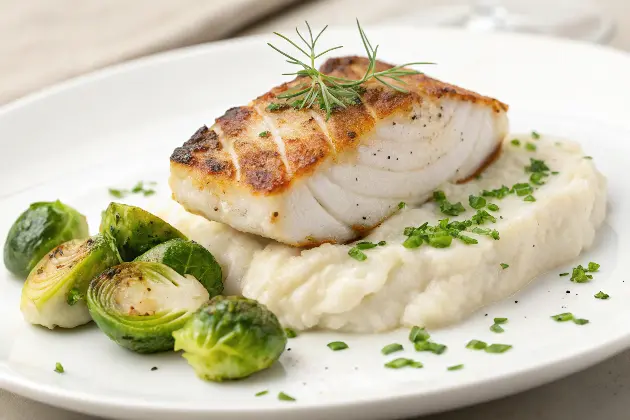Healthy 14-Day Real Food Diet Plan
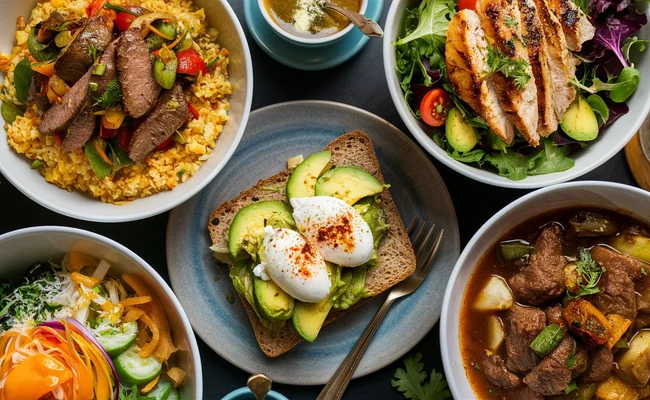
This post may contain affiliate links, meaning I may earn a commission if you make a purchase, at no extra cost to you. I only recommend products I trust. Thank you for your support.
In today’s world of processed and packaged foods, many people are turning to a real food diet to improve their health and well-being.
A 14-day real food diet plan can be an excellent way to jumpstart your journey towards cleaner eating habits and a healthier lifestyle.
This diet emphasizes the importance of nourishing the body with foods that are packed with vitamins, minerals, and antioxidants while avoiding additives, preservatives, and refined sugars.
If you’re looking to make a lasting change to your eating habits, this real food diet plan might be the perfect place to start.
This article will guide you through everything you need to know, from the benefits of a real food diet to a detailed 14-day real food meal plan, along with practical tips on how to start a real food diet and a comprehensive real food list.
What is a Real Food Diet?
A real food diet focuses on consuming whole, unprocessed foods that are as close to their natural state as possible.
This means avoiding packaged and processed foods that often contain artificial ingredients, preservatives, and added sugars.
Instead, the emphasis is on fresh fruits and vegetables, whole grains, lean proteins, and healthy fats.
What to Eat on a Real Food Diet
Here is a detailed list of foods that are considered part of a “real food” diet:
Fruits and Vegetables:
- All fresh fruits and vegetables
- Dried fruits (in moderation)
- Frozen fruits and vegetables (without added ingredients)
Proteins:
- Locally raised meats like pork, beef, and chicken (preferably in moderation)
- Wild-caught seafood
- Eggs
- Beans and legumes
- Nuts and seeds
Dairy:
- Milk
- Unsweetened yogurt
- Cheese
- Fortified soy milk and yogurt (as dairy alternatives)
Whole Grains:
- 100% whole wheat bread (preferably from a local bakery)
- Brown rice
- Oats
- Quinoa
- Barley
- Popcorn
Beverages:
- Water
- Occasional all-natural juices
- Naturally sweetened coffee and tea
- Wine and beer (in moderation for adults)
Sweeteners (In moderation):
- Honey
- Pure maple syrup
Snacks:
- Dried fruit
- Seeds
- Nuts
- Popcorn
14-Day Real Food Diet Plan (Real Food Menu)
This 14-day real food diet plan includes a diverse selection of wholesome, nutrient-dense meals designed to nourish your body and promote optimal health.
Each day features unique real food recipes that incorporate fresh vegetables, lean proteins, whole grains, and healthy fats, ensuring that you enjoy a variety of flavors and nutrients.
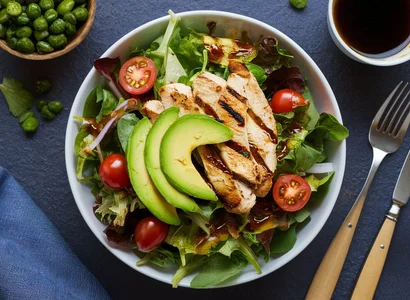
Day 1
Breakfast:
- Spinach and Mushroom Frittata: Eggs, spinach, mushrooms, and feta cheese baked in a skillet. (2 eggs, 1 cup spinach, 1/2 cup mushrooms, 1/4 cup feta cheese)
Lunch:
- Grilled Chicken and Avocado Salad: Mixed greens topped with grilled chicken breast, avocado, cherry tomatoes, and balsamic vinaigrette. (4 oz chicken breast, 2 cups mixed greens, 1/2 avocado, 1/2 cup cherry tomatoes, 2 tbsp balsamic vinaigrette)
Dinner:
- Baked Salmon with Roasted Brussels Sprouts: Wild-caught salmon fillet with lemon and dill, served with roasted Brussels sprouts. (6 oz salmon fillet, 1 cup Brussels sprouts, 1 tbsp lemon juice, 1 tsp dill)
Snacks:
- Apple slices with almond butter: (1 apple, 2 tbsp almond butter)
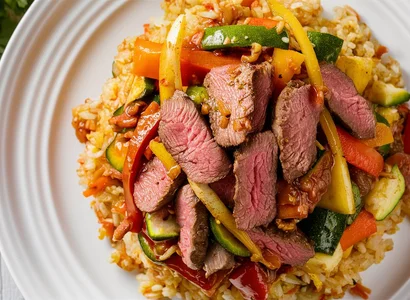
Day 2
Breakfast:
- Overnight Chia Seed Pudding: Chia seeds soaked in almond milk, topped with fresh berries and a drizzle of honey. (1/4 cup chia seeds, 1 cup almond milk, 1/2 cup fresh berries, 1 tsp honey)
Lunch:
- Turkey and Vegetable Soup: Homemade soup with lean turkey, mixed vegetables, and herbs in a clear broth. (4 oz turkey, 1 cup mixed vegetables, 2 cups broth, herbs to taste)
Dinner:
- Grass-Fed Beef Stir-Fry: Sliced beef stir-fried with mixed vegetables, served over cauliflower rice. (4 oz beef, 1 cup mixed vegetables, 1/2 cup cauliflower rice)
Snacks:
- Homemade trail mix with nuts and dried fruit (1/4 cup nuts, 1/4 cup dried fruit)
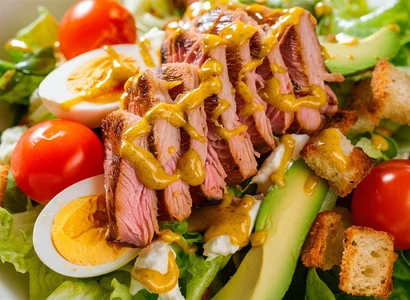
Day 3
Breakfast:
- Greek Yogurt Parfait: Layers of Greek yogurt, homemade granola, and fresh peaches. (1 cup Greek yogurt, 1/4 cup granola, 1 peach)
Lunch:
- Tuna Nicoise Salad: Mixed greens with tuna, hard-boiled eggs, green beans, olives, and lemon vinaigrette. (4 oz tuna, 2 cups mixed greens, 1 hard-boiled egg, 1/2 cup green beans, 1/4 cup olives, 2 tbsp lemon vinaigrette)
Dinner:
- Roasted Chicken with Sweet Potato Mash: Herb-roasted chicken breast with mashed sweet potatoes and steamed broccoli. (4 oz chicken breast, 1/2 cup sweet potatoes, 1 cup broccoli)
Snacks:
- Carrot sticks with hummus (1 cup carrot sticks, 2 tbsp hummus)
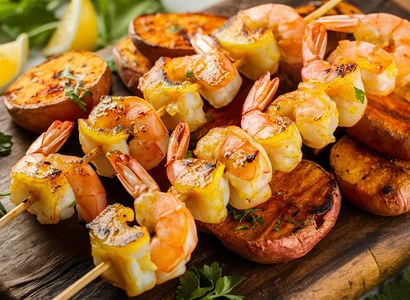
Day 4
Breakfast:
- Whole Grain Toast with Avocado and Poached Eggs: Mashed avocado on whole grain toast topped with poached eggs and a sprinkle of chili flakes. (2 slices whole grain toast, 1/2 avocado, 2 eggs, chili flakes to taste)
Lunch:
- Quinoa and Black Bean Bowl: Quinoa mixed with black beans, corn, diced tomatoes, and cilantro-lime dressing. (1/2 cup quinoa, 1/2 cup black beans, 1/4 cup corn, 1/2 cup diced tomatoes, 2 tbsp cilantro-lime dressing)
Dinner:
- Grilled Shrimp Skewers: Lemon-garlic marinated shrimp skewers with grilled zucchini and brown rice. (6 oz shrimp, 1 cup zucchini, 1/2 cup brown rice)
Snacks:
- Celery sticks with natural peanut butter (1 cup celery sticks, 2 tbsp peanut butter)
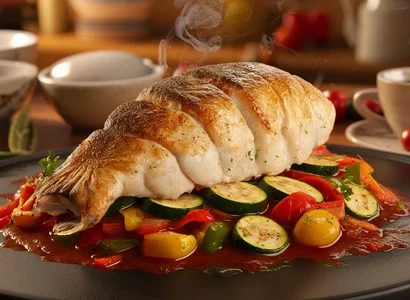
Day 5
Breakfast:
- Green Smoothie Bowl: Spinach, banana, and almond milk smoothie topped with chia seeds, sliced almonds, and coconut flakes. (1 cup spinach, 1 banana, 1 cup almond milk, 1 tbsp chia seeds, 2 tbsp sliced almonds, 1 tbsp coconut flakes)
Lunch:
- Lentil and Vegetable Curry: Spiced lentil and mixed vegetable curry served with brown rice. (1/2 cup lentils, 1 cup mixed vegetables, 1/2 cup brown rice, spices to taste)
Dinner:
- Baked Cod with Ratatouille: Oven-baked cod fillet served with a side of homemade ratatouille. (6 oz cod fillet, 1 cup ratatouille)
Snacks:
- Homemade kale chips (1 cup kale, 1 tbsp olive oil, salt to taste)
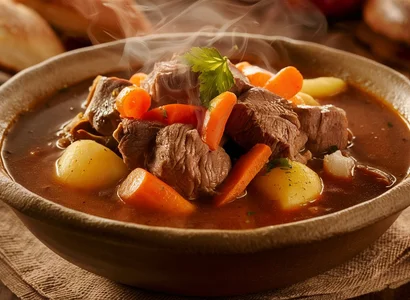
Day 6
Breakfast:
- Whole Grain Pancakes: Whole grain pancakes topped with fresh strawberries and a dollop of Greek yogurt. (2 pancakes, 1/2 cup strawberries, 1/4 cup Greek yogurt)
Lunch:
- Grilled Vegetable and Hummus Wrap: Whole grain wrap filled with grilled vegetables and homemade hummus. (1 wrap, 1 cup grilled vegetables, 2 tbsp hummus)
Dinner:
- Slow-Cooker Beef and Vegetable Stew: Tender beef chunks with root vegetables in a rich broth, slow-cooked to perfection. (4 oz beef, 1 cup root vegetables, 2 cups broth)
Snacks:
- Sliced bell peppers with guacamole (1 cup bell peppers, 1/4 cup guacamole)
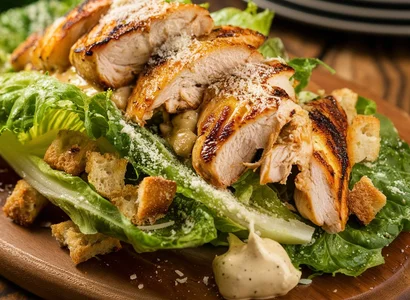
Day 7
Breakfast:
- Breakfast Burrito: Whole grain tortilla filled with scrambled eggs, black beans, salsa, and avocado. (1 tortilla, 2 eggs, 1/4 cup black beans, 2 tbsp salsa, 1/4 avocado)
Lunch:
- Grilled Chicken Caesar Salad: Romaine lettuce with grilled chicken, homemade Caesar dressing, and whole grain croutons. (4 oz chicken, 2 cups romaine lettuce, 2 tbsp Caesar dressing, 1/4 cup croutons)
Dinner:
- Baked Trout with Asparagus: Lemon and herb baked trout served with roasted asparagus and quinoa. (6 oz trout, 1 cup asparagus, 1/2 cup quinoa)
Snacks:
- Greek yogurt with honey and walnuts (1 cup Greek yogurt, 1 tbsp honey, 2 tbsp walnuts)
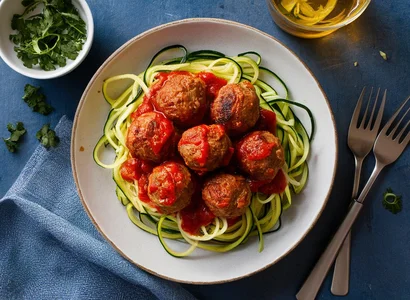
Day 8
Breakfast:
- Buckwheat Porridge: Creamy buckwheat porridge topped with sliced banana, cinnamon, and a drizzle of maple syrup. (1/2 cup buckwheat, 1 banana, 1/2 tsp cinnamon, 1 tsp maple syrup)
Lunch:
- Mediterranean Chickpea Salad: Chickpeas mixed with cucumber, tomatoes, feta cheese, and olive oil-lemon dressing. (1/2 cup chickpeas, 1/2 cup cucumber, 1/2 cup tomatoes, 1/4 cup feta cheese, 2 tbsp olive oil-lemon dressing)
Dinner:
- Turkey Meatballs with Zucchini Noodles: Lean turkey meatballs served over zucchini noodles with homemade marinara sauce. (4 oz turkey meatballs, 1 zucchini, 1/2 cup marinara sauce)
Snacks:
- Roasted chickpeas (1/4 cup chickpeas)
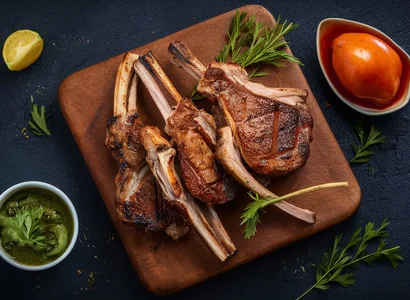
Day 9
Breakfast:
- Smoked Salmon and Cream Cheese on Whole Grain Bagel: Whole grain bagel topped with cream cheese, smoked salmon, capers, and red onion. (1 bagel, 2 tbsp cream cheese, 3 oz smoked salmon, 1 tbsp capers, 2 slices red onion)
Lunch:
- Spinach and Feta Quiche: Crustless quiche made with eggs, spinach, and feta cheese, served with a side salad. (2 eggs, 1 cup spinach, 1/4 cup feta cheese, 2 cups salad greens)
Dinner:
- Grilled Lamb Chops: Herb-marinated lamb chops with roasted Mediterranean vegetables and couscous. (6 oz lamb chops, 1 cup Mediterranean vegetables, 1/2 cup couscous)
Snacks:
- Apple slices sprinkled with cinnamon (1 apple, 1/2 tsp cinnamon)
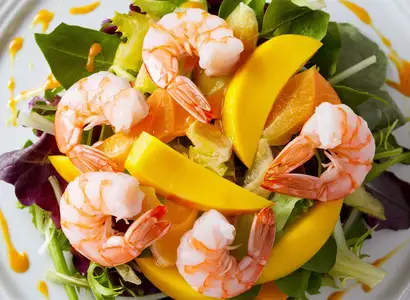
Day 10
Breakfast:
- Vegetable Frittata: Eggs baked with mixed vegetables and goat cheese, served with whole grain toast. (2 eggs, 1 cup mixed vegetables, 1/4 cup goat cheese, 2 slices whole grain toast)
Lunch:
- Shrimp and Mango Salad: Mixed greens topped with grilled shrimp, fresh mango, avocado, and cilantro-lime dressing. (4 oz shrimp, 2 cups mixed greens, 1/2 mango, 1/4 avocado, 2 tbsp cilantro-lime dressing)
Dinner:
- Stuffed Bell Peppers: Bell peppers filled with a mixture of ground turkey, quinoa, and vegetables, baked in tomato sauce. (2 bell peppers, 4 oz ground turkey, 1/2 cup quinoa, 1/2 cup mixed vegetables, 1/2 cup tomato sauce)
Snacks:
- Homemade energy balls: Dates, nuts, and cocoa powder mixed together and formed into balls. (3 energy balls: 1/4 cup dates, 1/4 cup nuts, 1 tbsp cocoa powder)
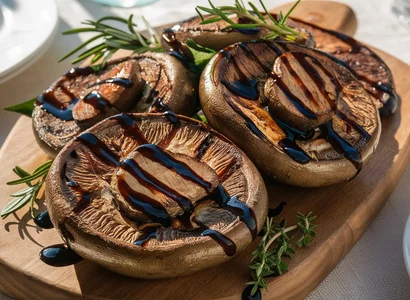
Day 11
Breakfast:
- Acai Bowl: Frozen acai blended with banana and topped with granola, fresh berries, and coconut flakes. (1 acai packet, 1 banana, 1/4 cup granola, 1/2 cup fresh berries, 1 tbsp coconut flakes)
Lunch:
- Caprese Chicken Sandwich: Grilled chicken breast with fresh mozzarella, tomato, and basil on whole grain bread. (4 oz chicken, 2 slices mozzarella, 2 slices tomato, 1 tbsp basil, 2 slices whole grain bread)
Dinner:
- Grilled Portobello Mushroom Steaks: Marinated and grilled portobello mushrooms served with roasted sweet potato wedges and sautéed spinach. (2 portobello mushrooms, 1 cup sweet potato wedges, 1 cup spinach)
Snacks:
- Hard-boiled eggs (2 eggs)
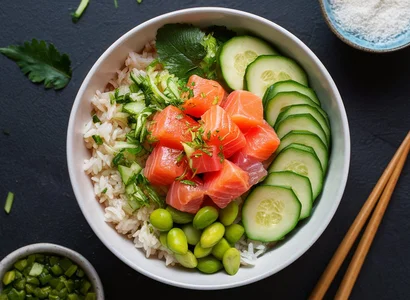
Day 12
Breakfast:
- Whole Grain Waffles: Homemade whole grain waffles topped with fresh mixed berries and a dollop of Greek yogurt. (2 waffles, 1/2 cup mixed berries, 1/4 cup Greek yogurt)
Lunch:
- Salmon Poke Bowl: Brown rice topped with raw salmon cubes, avocado, cucumber, edamame, and soy-ginger dressing. (1/2 cup brown rice, 4 oz salmon, 1/4 avocado, 1/2 cup cucumber, 1/4 cup edamame, 2 tbsp soy-ginger dressing)
Dinner:
- Herb-Roasted Chicken: Whole roasted chicken with herbs, served with roasted root vegetables. (4 oz chicken, 1 cup root vegetables)
Snacks:
- Sliced cucumber with tzatziki dip (1 cup cucumber, 1/4 cup tzatziki)
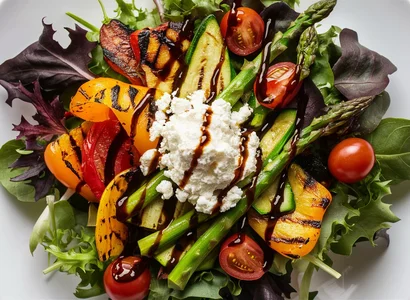
Day 13
Breakfast:
- Shakshuka: Eggs poached in a sauce of tomatoes, chili peppers, and onions, served with whole grain pita bread. (2 eggs, 1/2 cup tomato sauce, 1/4 cup chili peppers, 1/4 cup onions, 1 pita)
Lunch:
- Grilled Vegetable and Goat Cheese Salad: Mixed greens topped with grilled vegetables, crumbled goat cheese, and balsamic reduction. (2 cups mixed greens, 1 cup grilled vegetables, 1/4 cup goat cheese, 2 tbsp balsamic reduction)
Dinner:
- Baked Cod with Lemon-Caper Sauce: Oven-baked cod fillet with a light lemon-caper sauce, served with steamed green beans and wild rice. (6 oz cod fillet, 1 tbsp lemon-caper sauce, 1 cup green beans, 1/2 cup wild rice)
Snacks:
- Fresh fruit salad (1 cup mixed fruit)
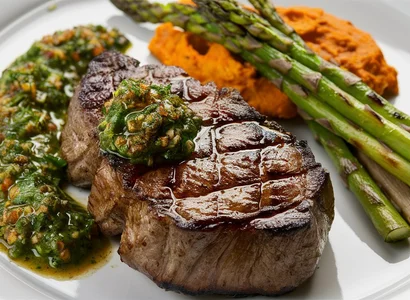
Day 14
Breakfast:
- Protein-Packed Smoothie: Blend of spinach, banana, almond milk, protein powder, and chia seeds. (1 cup spinach, 1 banana, 1 cup almond milk, 1 scoop protein powder, 1 tbsp chia seeds)
Lunch:
- Vegetable and Bean Burrito Bowl: Brown rice topped with black beans, grilled vegetables, salsa, and guacamole. (1/2 cup brown rice, 1/2 cup black beans, 1/2 cup grilled vegetables, 2 tbsp salsa, 1/4 cup guacamole)
Dinner:
- Grilled Steak with Chimichurri: Grass-fed steak with homemade chimichurri sauce, served with grilled asparagus and sweet potato mash. (6 oz steak, 2 tbsp chimichurri, 1 cup asparagus, 1/2 cup sweet potato mash)
Snacks:
- Mixed nuts and dried fruit (1/4 cup mixed nuts, 1/4 cup dried fruit)
Benefits of Eating Real Food
- Real foods are nutrient-dense, providing essential vitamins, minerals, and phytonutrients that our bodies need to function optimally.
- They contain naturally occurring fiber, which aids digestion and promotes gut health.
- Whole foods often have a better balance of macronutrients (carbohydrates, proteins, and fats) compared to processed alternatives.
- Real foods are typically less calorie-dense than processed foods, making it easier to maintain a healthy weight.
- The fiber and protein in whole foods help you feel fuller for longer, reducing overeating and snacking on unhealthy options.
- A diet rich in real foods has been linked to a lower risk of heart disease, type 2 diabetes, and certain cancers.
- The antioxidants and anti-inflammatory compounds found in many whole foods can help protect against cellular damage and chronic inflammation.
- The natural fibers in whole foods promote a healthy gut microbiome, which is crucial for overall health.
- Real foods are less likely to contain artificial additives that can irritate the digestive system.
- Nutrient-dense whole foods provide the building blocks for neurotransmitters, potentially improving mood and cognitive function.
- Some studies suggest that a diet rich in real foods may help reduce the risk of depression and anxiety.
- The vitamins, minerals, and antioxidants in real foods can contribute to healthier, clearer skin.
- Certain whole foods contain nutrients that support healthy sleep cycles, such as magnesium and tryptophan.
- Whole foods, especially those high in fiber, help regulate blood sugar levels, reducing spikes and crashes.
How To Start a Real Food Diet
Embracing a real food diet can have numerous health benefits, but transitioning to whole, unprocessed foods can be challenging if you’re used to convenience foods.
Here are some tips to help you get started on a real food diet:
- Focus on Whole, Unprocessed Foods: Choose foods that are as close to their natural state as possible. Fresh fruits, vegetables, whole grains, lean meats, fish, nuts, and seeds should make up the bulk of your diet.
- Read Labels Carefully: If you do purchase packaged foods, check the ingredient list. Look for items with minimal ingredients, and avoid anything with added sugars, artificial ingredients, or preservatives.
- Plan Your Meals: Planning meals ahead of time helps ensure you have the necessary ingredients on hand and prevents the temptation to reach for processed options.
- Cook at Home: Preparing your meals gives you control over the ingredients and allows you to experiment with new recipes.
- Shop the Perimeter of the Grocery Store: The perimeter of most grocery stores typically contains fresh produce, meats, and dairy products. By shopping primarily in these areas, you can avoid processed foods found in the center aisles.
- Incorporate a Variety of Foods: Eating a wide range of foods ensures you get all the essential nutrients your body needs. Include different colors of fruits and vegetables, various protein sources, and a mix of grains and legumes.
- Prioritize Quality Over Quantity: Choose high-quality, nutrient-dense foods over calorie-rich, nutrient-poor options. Organic produce, grass-fed meats, and wild-caught fish are excellent choices when possible.
- Stay Hydrated: Drink plenty of water throughout the day. Herbal teas and water-infused with fruits or herbs can also be hydrating and add flavor without added sugars.
- Be Mindful of Portions: Even though real foods are healthier, portion control is still important. Eating appropriate portions helps prevent overeating and ensures you get the right balance of nutrients.
- Allow for Flexibility: A real food diet doesn’t have to be all-or-nothing. It’s okay to indulge occasionally or include processed foods in moderation. The key is to make real foods the foundation of your diet.
- Learn to Cook in Batches: Cooking in batches and freezing meals or ingredients can save time and provide healthy options for busy days. Soups, stews, and casseroles are great for batch cooking.
Conclusion
A 14-day real food diet plan can be an excellent way to reset your eating habits and improve your overall health.
By focusing on whole, unprocessed foods, you’ll naturally increase your nutrient intake and reduce your consumption of harmful additives.
Remember that sustainable change takes time, so be patient with yourself as you transition to a real food diet.
With dedication and the right mindset, you can make lasting improvements to your diet and enjoy the numerous benefits of eating real food.
- 7-day low glycemic diet
- Alkaline diet recipes
- 7-day high-fiber meal plan
- 7-day Aldi meal plan
- 7-day Mounjaro diet for beginners
- The Dukan diet attack phase diet plan
- What is the BRAT diet?
- Best 7-day keto diet plan with a complete foods list
- 14-day Atkins Phase 1 diet plan
- Lion diet recipes
- Gastric bypass safe foods to eat after surgery
- Foods to eat while on Ozempic
- Candida diet recipes
FAQs
What is a whole real food diet?
A whole real food diet focuses on consuming foods that are minimally processed and as close to their natural state as possible. This includes fruits, vegetables, whole grains, lean proteins, and healthy fats.
The diet emphasizes avoiding packaged and processed foods that often contain artificial ingredients, preservatives, and added sugars.
Is oatmeal a whole food?
Yes, oatmeal is considered a whole food. Whole oats are minimally processed and retain their bran and germ, which contain important nutrients and fiber.
Choose plain, unflavored oatmeal without added sugars or artificial ingredients for the most nutritional benefits.
Is rice a real food?
Yes, rice can be considered a real food, especially when consumed in its whole grain form. Brown rice, wild rice, and other whole grain varieties are minimally processed and retain their natural nutrients.
White rice, while more processed, can still be part of a balanced real food diet when consumed in moderation.
What qualifies as real food?
Real food typically meets the following criteria:
1. Minimally processed or unprocessed
2. Free from artificial additives, preservatives, and colors
3. Whole and unrefined
4. Nutrient-dense
5. Recognizable ingredients Examples include fresh fruits and vegetables, whole grains, lean meats, fish, eggs, nuts, seeds, and legumes.
How to lose weight with real food?
To lose weight with real food, focus on eating nutrient-dense, whole foods that are low in calories but high in fiber and protein. This helps to keep you full and satisfied, reducing the likelihood of overeating.
Combining a real food diet with regular exercise can further enhance weight loss efforts.
